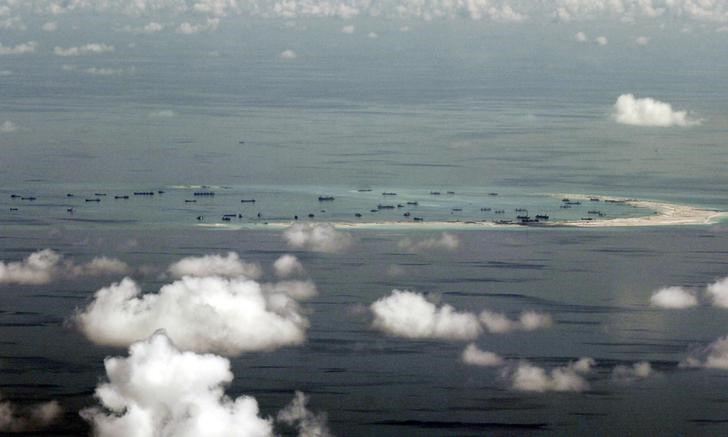By Phil Stewart and David Brunnstrom
WASHINGTON (Reuters) - The Pentagon is considering sending U.S. military aircraft and ships to assert freedom of navigation around rapidly growing Chinese-made artificial islands in the disputed South China Sea, a U.S. official said on Tuesday.
Defense Secretary Ash Carter requested options that include sending aircraft and ships within 12 nautical miles (22 km) of reefs that China has been building up in the Spratly island chain, the official said.
Such a move would directly challenge Chinese efforts to expand its influence in the maritime heart of Southeast Asia.
"We are considering how to demonstrate freedom of navigation in an area that is critical to world trade," the U.S. official said, speaking on condition of anonymity, adding that any options would need White House approval.
Carter's request was first reported earlier on Tuesday by the Wall Street Journal, which said one option was to fly Navy surveillance aircraft over the islands.
It quoted U.S. officials as saying there was now growing momentum within the Pentagon and the White House for taking concrete steps in order to send Beijing a signal that the recent build up in the Spratlys had gone too far and needed to stop.
The Pentagon and White House did not immediately comment but the South China Sea is likely to be a topic of discussion when U.S. Secretary of State John Kerry visits China this weekend.
Part of Kerry's trip will focus on preparations for the annual U.S.-China Strategic and Economic Dialogue scheduled to be held in Washington in late June.
Chinese embassy spokesman Zhu Haiquan said China had "indisputable sovereignty" over the Spratlys, adding China's construction there was "reasonable, justified and lawful".
Beijing claims sovereignty over most of the South China Sea, through which $5 trillion in ship-borne trade passes every year. The Philippines, Vietnam, Malaysia, Taiwan and Brunei also have overlapping claims.
News of the possibly tougher U.S. stance came as a key pillar of President Barack Obama's rebalance to Asia in the face of China's rising power suffered a major blow at the hands of Democrats in the U.S. Senate, who blocked debate on a bill that would have smoothed the path for a 12-nation pan-Pacific trade deal.
RISK OF CONFRONTATION
The practice of sending ships and aircraft near the artificial islands would be in line with regular U.S. military "Freedom of Navigation" operations, which it conducted last year to challenge maritime claims of 19 countries, including China.
China drew condemnation from Japan and the United States in 2013 when it imposed an Air Defense Identification Zone (ADIZ) in the East China Sea, in which aircraft are supposed to identify themselves to Chinese authorities.
The United States responded by flying B-52 bombers through the zone.
Rory Medcalf, head of the National Security College at the Australian National University, said if the key policy response being considered to Beijing's reclamation in the Spratlys involved a show of force, it suggested Washington and its allies did not have many good options.
"The risk of this is that China may use such deployments as a reason to try to challenge or confront U.S. forces," he said.
The Philippines, a U.S. treaty ally, said urgent action was needed.
"We are taking the position that we must do something quickly lest the massive reclamation results in the de facto control by China of the South China Sea," Foreign Secretary Albert del Rosario said at the Center for Strategic and International Studies think tank in Washington.
He said he was in Washington to see what more the two allies could do.
Recent satellite images have shown that since about March 2014, China has conducted reclamation work at seven sites in the Spratlys and is constructing a military-sized air strip on Fiery Cross Reef and possibly a second on another reef.
A senior U.S. military commander familiar with the situation in Asia said he believed the runway would be finished as early as the year-end and would be capable of handling a wide array of military aircraft.
This would allow China to extend its air coverage for patrols and while an ADIZ was not inevitable, it was likely China would eventually declare one in the South China Sea, said the commander, who declined to be identified.

China has said it had every right to set up such zones but that current conditions in the South China Sea did not warrant one.